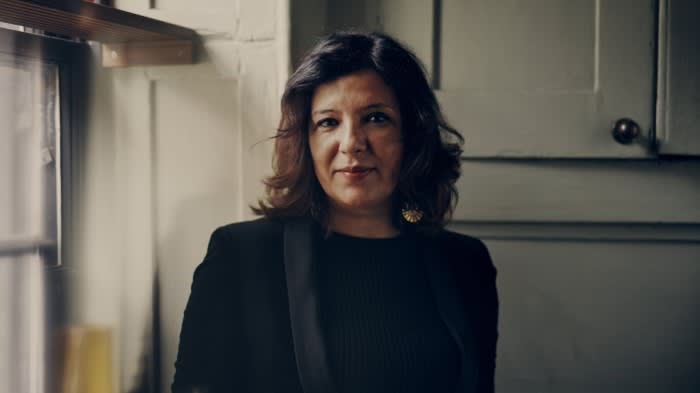Stay informed with free updates
Simply sign up to the Film myFT Digest — delivered directly to your inbox.
In the opening shots of Four Daughters, Eya, Tayssir and their mother Olfa stare shyly into Kaouther Ben Hania’s camera lens. They are the remaining members of a Tunisian family wrecked by the disappearance of the two older children: Ghofrane and Rahma were teenagers when, in 2015, they joined the Islamic State terrorist group in Libya, before being imprisoned. Sparked by their absence, Four Daughters maps the depths of their mother’s and sisters’ grief to answer the question: why did they leave?
Ben Hania became aware of the family’s story in 2016 through television appearances made by Olfa in which she blamed the Tunisian government for her daughters’ fate. After Ghofrane ran away, Olfa had reported Rahma — who wanted to join her sister — to the police, but no one stopped her. The film searches for the root of the daughters’ decision to leave, without reaching for snap judgments. “Nowadays, there is no place for nuance or understanding,” Ben Hania laments when we meet at a private members’ club in London’s Soho. But, she adds, “cinema helps us go deeper than our preconceptions.”
The film has impressed critics and festival juries: awarded the L’Œil d’Or documentary prize at Cannes last year, Four Daughters is now competing for an Oscar in the best documentary feature category. This makes Ben Hania the first Arab woman director to be nominated for two Academy Awards, having received a best international feature film nod for The Man Who Sold His Skin (2020).
Ben Hania was born in Sidi Bouzid in 1977, a period of rapid economic growth in Tunisia. But under dictator Zein al-Abidine Ben Ali, who ruled the country from 1987 to 2011, she was unable to express herself freely. After studies in Paris, she directed short films, documentaries, dramas and thrillers. Informed by her experiences in France and Tunisia, Ben Hania’s razor-sharp analysis of identity, sexuality and religion is as cinematically hypnotic as it is emotionally stirring. Beauty and the Dogs (2017), for example, unravels the psychological and bureaucratic loop endured by a young Tunisian woman striving to press charges against the police officers who raped her.
Having conceived Four Daughters as a fly-on-the-wall documentary, Ben Hania delayed it to focus on the more experimental The Man Who Sold His Skin (2020), a thriller following a refugee who gets his back tattooed in a desperate attempt to enter Europe.

When she returned to Four Daughters, she opted for a curious, complex blend of documentary and dramatic re-enactment. While the real Olfa, Eya and Tayssir relive the years that culminated in Ghofrane and Rahma’s departure in harrowing interviews, actresses Ichraq Matar (Ghofrane), Nour Karoui (Rahma) and Hend Sabri (Olfa) join them for scenes in which they and the family together replay key moments from the past. There is no narrative separation between fictional and non-fictional characters: the actresses become a mirror, enabling the three real women to see themselves, observe their mistakes and envision alternatives. Their performances are so absorbing that, at times, the audience (and seemingly even the family) momentarily forgets that this is not the real Ghofrane and Rahma.
It begins with Olfa’s bedding ceremony: here, Sabri and actor Majd Mastoura (playing Olfa’s husband) reinterpret her traumatic wedding night as the start of an abusive relationship. The film then captures the siblings as they revive games from their childhood, deal with the awkwardness of puberty and comfort each other amid financial and personal distress. We learn where Ghofrane and Rahma’s lust for rebellion — subtly unveiled as they grow estranged from their mother — stems from. Despite some touching moments of togetherness, the illusion of Olfa as a healthy parental figure fades quickly: she tells the girls to be ashamed of their bodies, rebukes them for alleged promiscuity and nearly knocks Ghofrane unconscious while punishing her for dyeing her hair during a goth phase that came prior to her radicalisation.
While the conflicts surrounding sexuality and women’s bodies clearly stem from restrictive religious doctrine, Ben Hania explains that other factors fuel it too: “Olfa is a guardian of patriarchy, perpetuating its values on her daughters.” While she musters the courage to divorce her violent husband, she is unable to stop years of abuse from spilling on to her children. “It’s like a Greek tragedy,” the director says.
The family suffers further trauma following the divorce, when Olfa’s new boyfriend is accused of sexual abuse by her daughters. In this re-enactment, the real Tayssir sits on a bed beside Mastoura (who also plays the boyfriend), expressing her resentment towards him while feeling a knife. Unable to cope with the psychological charge of the moment, Mastoura walks off set. On its meta level, “the film explores what it means for an actor to confront a disturbing reality,” Ben Hania says. “When Tayssir shares this confession, Mastoura can’t deal with it. Still, it’s her who calls him back to the set and tells us that she needs that scene.”
It was the rise of ultra-conservative Salafi preachers, which followed the ousting of Ben Ali in 2011, that led to the girls’ radicalisation and flight. Having previously rebelled by embracing heavy metal, bold fashion choices and teenage romances, they now moved to the other extreme, preyed upon by religious radicals who had been suppressed during the dictatorship. Within two years, the sisters had switched their modern clothes for niqabs and begun to observe sharia law. Would they still be at home had the Arab Spring not happened? It’s hard to tell, says Ben Hania, but “people who think it was a failure don’t know history. Revolutions force us to build a country from scratch. Things won’t be perfect the next day, but it is a process.”
I ask her if she thinks she has succeeded in translating the gravity of Olfa’s and her daughters’ ordeal to the screen. She smiles, gently lowering her palms towards the floor as if urging us to slow down. With Four Daughters, “we are no longer [only] in the Arab context,” Ben Hania says. Rather, the film’s message is universal: “Behind every headline lies a shared human story.”
‘Four Daughters’ is in UK cinemas now
Also Read More: World News | Entertainment News | Celebrity News








